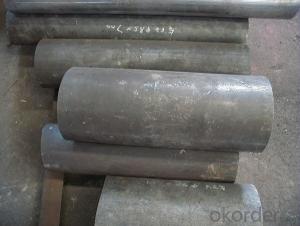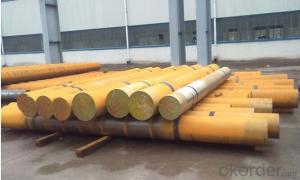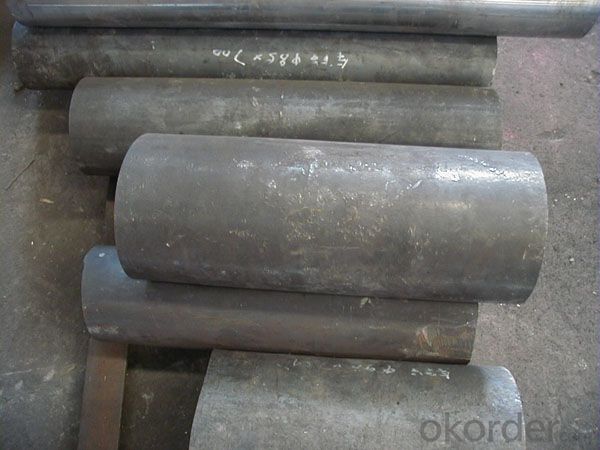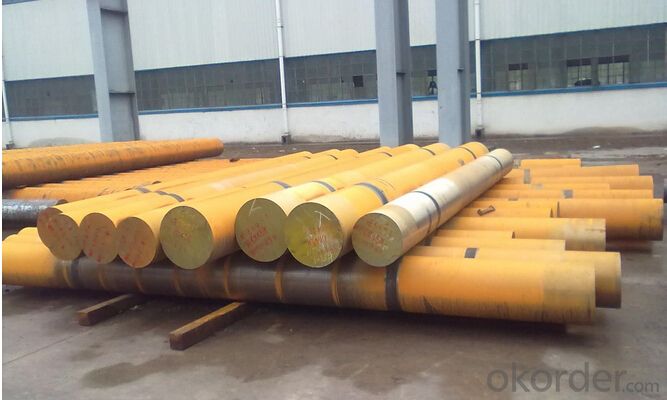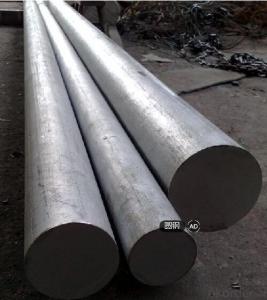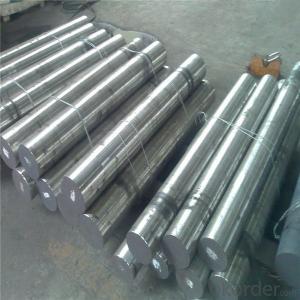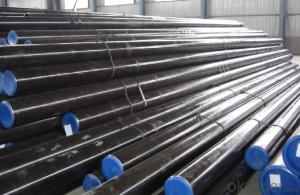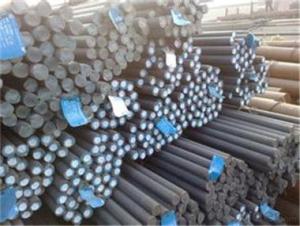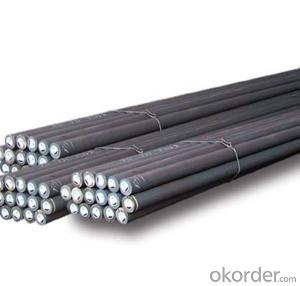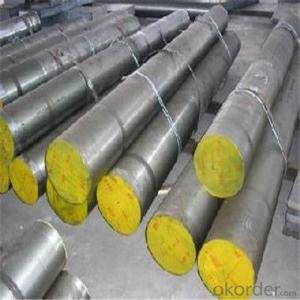Forged Steel Bar S136 / Die Steel S136 / Steel Round Bar S136
- Loading Port:
- China main port
- Payment Terms:
- TT OR LC
- Min Order Qty:
- 25 m.t.
- Supply Capability:
- 10000 m.t./month
OKorder Service Pledge
OKorder Financial Service
You Might Also Like
Specification
The details of our Steel
1. Produce Standard: as the GB, AISI, ASTM, SAE, EN, BS, DIN, JIS Industry Standard
2. Produce processes: Smelt Iron -EAF smelt Billet - ESR smelt Billet -Hot rolled or forged get the steel round bar and plate
3. Heat treatment:
Normalized / Annealed / Quenched+Tempered
4. Quality assurance:
All order we can received Third party inspection, You can let SGS, BV,.. and others test company test and inspect our products before Goods shipping.
Product information
Chemical Composition(%) of steel round bar S136 | C | Si | Mn | S | P | Cr | Mo |
0.34-0.42 | 0.60-1.30 | 0.20-0.70 | ≤0.030 | ≤0.030 | 13.00-14.50 | 0.15-0.40 | |
Specification of steel round bar S136 | Dia.mm*Lmm=100~600*6000 | ||||||
Application of steel round bar S136 | Used for various large-sized mirror plastic mould, precision plastic mould, like, cars accessories, home appliances, electronic equipment plastic mould. | ||||||
Characteristic of steel round bar S136 | 1)Pure and precision mirror polishing,good abrasion resistance | ||||||
Heat Treatment of steel round bar S136 | Normalized / Annealed / Quenched / tempered | ||||||
Product show

Workshop show

- Q: What are the different forging methods used for special steel?
- There are several different forging methods that are commonly used for special steel. These methods include open die forging, closed die forging, and ring rolling. Open die forging, also known as smith forging, is a technique where the metal is heated and shaped between flat dies or anvils. The metal is repeatedly hammered and rotated to achieve the desired shape. This method is commonly used for producing large and complex shapes with a high degree of customization. Closed die forging, also known as impression die forging, involves placing the heated metal between two or more dies that contain impressions of the desired final shape. The metal is then compressed to fill the impressions and take on the shape of the dies. This method is commonly used for producing small to medium-sized components with high precision and dimensional accuracy. Ring rolling is a forging method specifically used for producing seamless rings. The metal is heated and placed between two rollers that apply pressure to shape the metal into a ring. This method is commonly used for producing rings with large diameters and thin walls. In addition to these primary forging methods, there are various secondary forging processes that can be used to further refine and enhance the properties of the special steel. These secondary processes include heat treatment, such as annealing or quenching, to improve the material's strength and hardness. Additionally, machining operations may be performed to achieve the desired final dimensions and surface finish. Overall, the choice of forging method for special steel depends on factors such as the desired shape, size, and properties of the final product. Each method offers its own advantages and limitations, and manufacturers select the most appropriate technique based on the specific requirements of the application.
- Q: What are the different surface treatment methods used for special steel?
- There are several different surface treatment methods used for special steel, including but not limited to electroplating, galvanizing, powder coating, and heat treatment. These methods help to enhance the corrosion resistance, improve the appearance, and increase the durability of special steel products.
- Q: How does special steel perform in cryogenic environments?
- The performance of special steel in cryogenic environments is exceptional. Cryogenic temperatures, which are temperatures below -150°C (-238°F), require materials that can withstand and excel in such extreme conditions. Special steel is specifically designed to possess these qualities. One of the key characteristics of special steel is its ability to maintain its strength and toughness even in low temperatures. Unlike other materials that become brittle and prone to fractures in cryogenic environments, special steel retains its mechanical properties, ensuring the structural integrity and reliability of equipment or structures. This is particularly important in industries where safety is of utmost importance, such as aerospace and nuclear. Furthermore, special steel exhibits excellent resistance to corrosion and oxidation, even at cryogenic temperatures. This resistance is crucial as cryogenic environments often involve the presence of gases, liquids, or chemicals that can accelerate corrosion. By resisting corrosion, special steel ensures its longevity and minimizes the risk of material degradation, thereby enhancing the overall performance and lifespan of equipment or structures. Apart from its mechanical and corrosion-resistant properties, special steel also possesses good thermal conductivity. This property enables efficient heat transfer, which is critical in cryogenic environments where temperature control and management are vital. Special steel's ability to efficiently conduct heat ensures that equipment and structures remain at the desired low temperatures without any significant thermal variations. Moreover, the suitability of special steel for cryogenic environments is evident in its wide range of applications. It is commonly used in cryogenic storage tanks for liquefied gases like liquid oxygen, nitrogen, and argon. It is also utilized in the construction of cryogenic pipelines, valves, and other components, where its exceptional performance guarantees the safe transport and containment of cryogenic fluids. In conclusion, special steel performs exceptionally well in cryogenic environments due to its retained strength and toughness, resistance to corrosion, good thermal conductivity, and wide range of applications. Its ability to withstand extreme cold temperatures makes it a reliable and preferred choice for various industries that require dependable performance in cryogenic conditions.
- Q: What are the different surface finishing techniques for special steel parts?
- There are several surface finishing techniques for special steel parts, including electroplating, powder coating, painting, polishing, and passivation. Each technique offers unique benefits and can be chosen based on the desired appearance, corrosion resistance, durability, and functionality of the steel parts.
- Q: What are the properties of wear-resistant tool steel?
- Wear-resistant tool steel typically possesses high hardness and excellent toughness, allowing it to withstand abrasion, impact, and deformation. It also has good heat resistance, retaining its strength and hardness at elevated temperatures. Additionally, wear-resistant tool steel exhibits good dimensional stability and corrosion resistance, making it a durable and long-lasting material for cutting, forming, and shaping tools.
- Q: How does special steel contribute to the manufacturing of industrial machinery?
- Special steel contributes to the manufacturing of industrial machinery by providing enhanced strength, durability, and resistance to wear and corrosion. It allows for the production of components that can withstand high temperatures, heavy loads, and harsh operating conditions. The unique properties of special steel enable the creation of precision parts, gears, bearings, and tools that are crucial for the efficient and reliable functioning of industrial machinery.
- Q: Can special steel be used in the chemical industry?
- Yes, special steel can be used in the chemical industry. Special steel is often chosen for its resistance to corrosion, high temperature stability, and strength, making it suitable for various applications in the chemical industry such as storage tanks, pipelines, and equipment used in the manufacturing of chemicals.
- Q: What is the significance of vanadium in special steel?
- Due to its unique properties and effects on the performance of steel, vanadium is an important element in special steel. Special steel, which is designed for specific applications requiring strength, durability, and specific characteristics, benefits greatly from the inclusion of vanadium. One of the primary rationales behind using vanadium in special steel is its ability to increase the steel's strength and toughness. Vanadium forms robust carbides within the microstructure of the steel, which prevent grain growth and enhance its resistance to deformation and cracking. This makes the steel highly suitable for applications that demand exceptional strength, such as the construction of bridges, high-rise buildings, and machinery. In addition to strength, vanadium also improves the hardenability of the steel. Hardenability refers to the steel's capacity to be hardened through heat treatment methods like quenching and tempering. Vanadium enhances the hardenability of the steel, enabling easy achievement of desired properties like increased wear resistance and improved cutting performance. This makes vanadium-containing special steel ideal for tools, dies, and other applications requiring hardness and wear resistance. Furthermore, vanadium contributes to the steel's resistance to corrosion. It creates stable oxide layers on the steel's surface, acting as a protective barrier against corrosion and oxidation. This is particularly advantageous in harsh environments like marine environments or chemical processing plants. Moreover, vanadium also enhances the heat resistance and thermal stability of special steel. It helps the steel retain its strength and hardness even at high temperatures, making it suitable for applications involving high-temperature environments like aerospace components and automotive engine parts. In summary, the importance of vanadium in special steel lies in its ability to enhance the steel's strength, toughness, hardenability, corrosion resistance, and heat resistance. These properties make vanadium-containing special steel highly sought after in various industries that require exceptional performance and reliability.
- Q: What are the properties of magnetic alloy steel?
- Magnetic alloy steel possesses magnetic properties due to its composition of iron and other elements such as nickel, cobalt, and chromium. These alloys are known for their high magnetism, excellent strength, and resistance to corrosion. They have a wide range of applications in industries like electrical engineering, automotive, and aerospace, where their magnetic properties are crucial for tasks like generating and directing magnetic fields, magnetic shielding, and producing high-performance magnets.
- Q: What are the requirements for special steel used in chemical processing?
- The requirements for special steel used in chemical processing are generally more stringent compared to regular steel due to the harsh and corrosive nature of the chemicals involved. Some of the key requirements for special steel in chemical processing include: 1. Corrosion resistance: Special steel used in chemical processing must exhibit high resistance to corrosion from acids, alkalis, and other corrosive chemicals. This is achieved by adding alloying elements such as chromium, nickel, and molybdenum, which form a protective oxide layer on the surface of the steel, preventing it from reacting with the chemicals. 2. High temperature resistance: Chemical processing often involves high-temperature reactions. Therefore, special steel used in this industry must have excellent heat resistance to maintain its strength and structural integrity at elevated temperatures. This is achieved by adding elements like chromium, nickel, and tungsten, which help in maintaining the stability of the steel at high temperatures. 3. Mechanical strength: Special steel used in chemical processing should possess sufficient mechanical strength to withstand the pressures and loads encountered in the process equipment. This requirement is met by adding alloying elements such as manganese, silicon, and carbon, which enhance the steel's strength and toughness. 4. Weldability: Weldability is a crucial requirement for special steel used in chemical processing as it allows for easy fabrication and installation of process equipment. Special steel with good weldability ensures strong and reliable joints, which are essential for the safe and efficient operation of chemical plants. 5. Resistance to stress corrosion cracking: Stress corrosion cracking is a significant concern in chemical processing environments. Therefore, special steel used in this industry should have good resistance to stress corrosion cracking, which is achieved by carefully selecting the alloying elements and controlling the material's microstructure. 6. Cleanliness: Special steel used in chemical processing should be free from impurities and have a low content of harmful elements that could contaminate the process or react with the chemicals. This necessitates strict quality control measures during steel production to ensure the desired cleanliness and purity. Meeting these requirements ensures that special steel used in chemical processing can withstand the aggressive chemical environment, high temperatures, and mechanical stresses encountered in the industry, leading to safe and reliable operation of the process equipment.
Send your message to us
Forged Steel Bar S136 / Die Steel S136 / Steel Round Bar S136
- Loading Port:
- China main port
- Payment Terms:
- TT OR LC
- Min Order Qty:
- 25 m.t.
- Supply Capability:
- 10000 m.t./month
OKorder Service Pledge
OKorder Financial Service
Similar products
Hot products
Hot Searches
Related keywords
